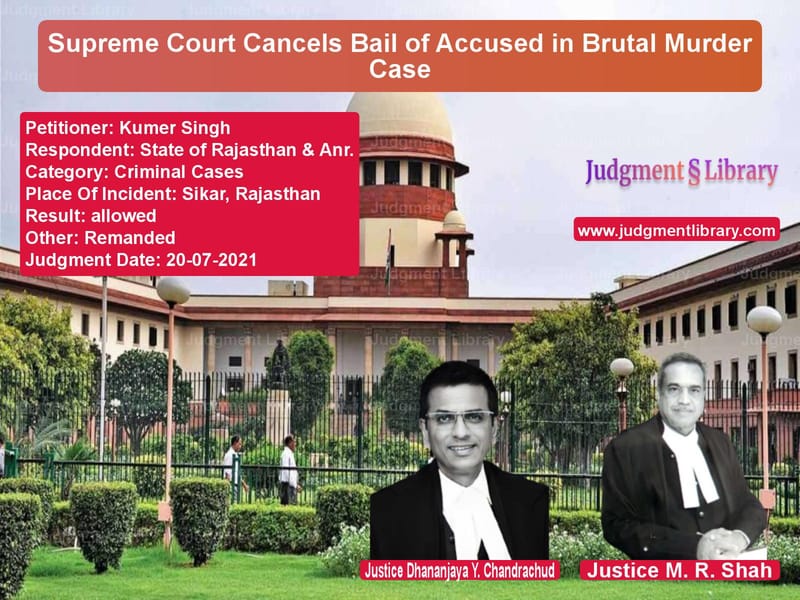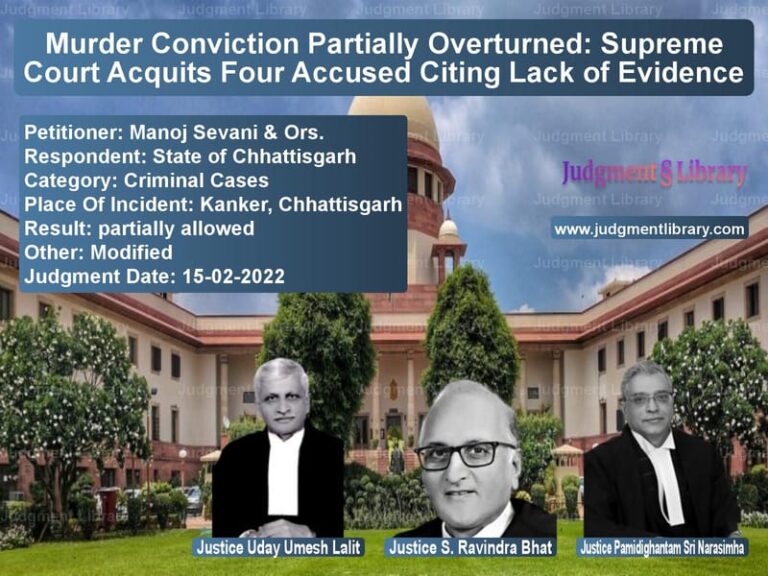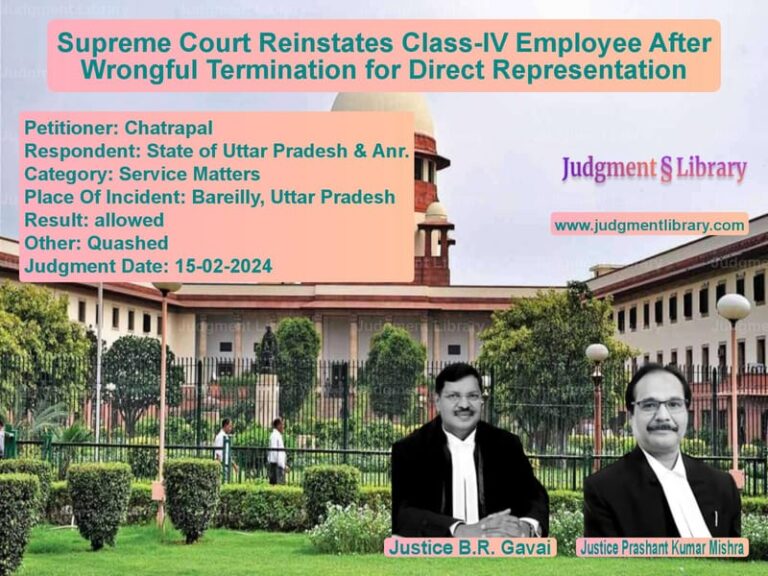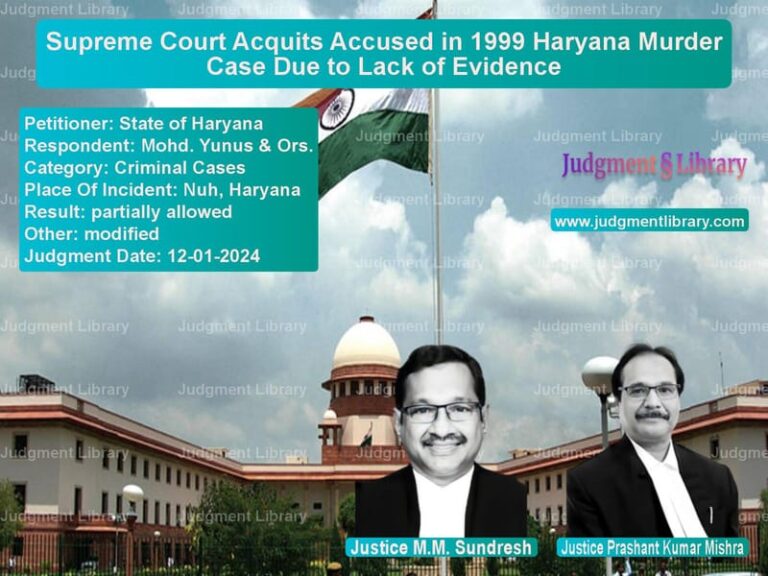Supreme Court Cancels Bail of Accused in Brutal Murder Case
The Supreme Court of India, in a landmark ruling, set aside the bail granted to three accused individuals—Kamlesh, Arif, and Bhojraj Singh—in a brutal murder case where the victim, a Border Security Force (BSF) personnel, was killed in a premeditated attack. The Court found the High Court’s order to grant bail improper, citing a failure to consider the severity of the crime and the legal principles governing bail in cases involving heinous offenses.
Background of the Case
The case involved the murder of Sumer Singh, a BSF officer on leave, who was ambushed and attacked by a group of assailants carrying weapons including swords, knives, and iron rods. The incident took place on August 16, 2017, in the district of Sikar, Rajasthan. The accused, who had long-standing enmity with the deceased, allegedly pre-planned the attack, blocked his vehicle’s path, and carried out a targeted assault. The victim suffered 26 injuries and died on the spot. His brother, Vikram Singh, also sustained 11 injuries in the attack.
Legal Issues Considered
- Whether the High Court erred in granting bail to the accused despite the gravity of the offense.
- Whether the principle of collective liability under Section 149 of the IPC applies to all accused persons.
- The duty of appellate courts in reviewing bail orders in cases involving serious criminal charges.
Petitioner’s Arguments
The complainant, brother of the deceased, challenged the bail order, arguing that:
- The High Court failed to consider the heinous nature of the crime and the strong evidence against the accused.
- The trial court had earlier rejected bail applications after noting the severity of the attack.
- The accused were part of an unlawful assembly that had meticulously planned the attack, ensuring there was no escape for the victim.
- The accused could influence witnesses if released on bail, thereby obstructing justice.
Respondents’ Arguments
The accused, on the other hand, contended that:
- They had been in custody for more than a year before being granted bail.
- The High Court had previously allowed the accused to reapply for bail after the recording of key witnesses’ statements.
- The evidence did not directly implicate them as primary perpetrators.
- They had adhered to all bail conditions and had not misused their liberty.
Supreme Court’s Observations
The Supreme Court strongly disapproved of the High Court’s order, stating:
“The High Court failed to consider the brutality of the crime, the presence of multiple injuries on the deceased, and the premeditated nature of the attack. Granting bail in such a case, without detailed reasoning, amounts to a grave miscarriage of justice.”
The Court emphasized:
- Bail cannot be granted in serious cases merely because the accused have spent time in custody.
- Judges must provide a well-reasoned order explaining why bail is justified in cases involving grave offenses.
- The accused were part of an unlawful assembly and liable under Section 149 IPC.
- The High Court failed to consider the interests of justice while passing the bail order.
Key Precedents Cited
- Mahipal v. Rajesh Kumar – Affirmed that bail should not be granted when the offense is of a serious nature.
- Neeru Yadav v. State of U.P. – Held that High Courts must evaluate all relevant factors before granting bail.
- Ramesh Bhavan Rathod v. Vishanbhai Makwana – Reinforced that appellate courts have a duty to scrutinize bail orders for legal correctness.
Final Judgment
The Supreme Court allowed the appeal, canceled the bail of the accused, and directed them to surrender immediately. The Court further instructed the trial court to expedite the proceedings to ensure justice was served without undue delay.
Impact of the Judgment
This ruling has significant implications for the criminal justice system:
- Reaffirmation of Bail Principles: The decision reinforces that bail in serious cases cannot be granted arbitrarily and must be based on sound judicial reasoning.
- Protection of Witnesses: It ensures that accused individuals in heinous crimes remain in custody to prevent witness tampering.
- Precedent for Future Cases: Courts handling bail applications in murder cases must follow a stricter approach in evaluating the circumstances.
Conclusion
The Supreme Court’s judgment in Kumer Singh v. State of Rajasthan serves as a crucial precedent in ensuring that bail is granted only when justified. By canceling the High Court’s bail order, the ruling underscores the importance of judicial scrutiny in cases involving heinous crimes and upholds the integrity of the legal system.
Petitioner Name: Kumer Singh.Respondent Name: State of Rajasthan & Anr..Judgment By: Justice Dhananjaya Y. Chandrachud, Justice M. R. Shah.Place Of Incident: Sikar, Rajasthan.Judgment Date: 20-07-2021.
Don’t miss out on the full details! Download the complete judgment in PDF format below and gain valuable insights instantly!
Download Judgment: kumer-singh-vs-state-of-rajasthan-&-supreme-court-of-india-judgment-dated-20-07-2021.pdf
Directly Download Judgment: Directly download this Judgment
See all petitions in Murder Cases
See all petitions in Bail and Anticipatory Bail
See all petitions in Attempt to Murder Cases
See all petitions in Judgment by Dhananjaya Y Chandrachud
See all petitions in Judgment by Mukeshkumar Rasikbhai Shah
See all petitions in allowed
See all petitions in Remanded
See all petitions in supreme court of India judgments July 2021
See all petitions in 2021 judgments
See all posts in Criminal Cases Category
See all allowed petitions in Criminal Cases Category
See all Dismissed petitions in Criminal Cases Category
See all partially allowed petitions in Criminal Cases Category







